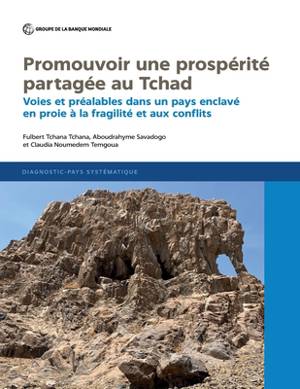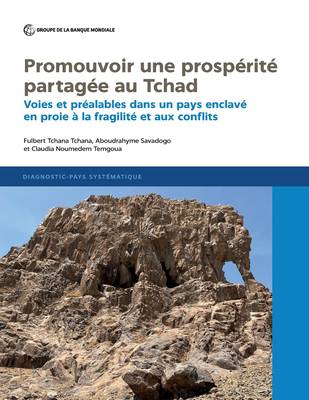
En raison d'une grêve chez bpost, votre commande pourrait être retardée. Vous avez besoin d’un livre rapidement ? Nos magasins vous accueillent à bras ouverts !
- Retrait gratuit dans votre magasin Club
- 7.000.000 titres dans notre catalogue
- Payer en toute sécurité
- Toujours un magasin près de chez vous
En raison de la grêve chez bpost, votre commande pourrait être retardée. Vous avez besoin d’un livre rapidement ? Nos magasins vous accueillent à bras ouverts !
- Retrait gratuit dans votre magasin Club
- 7.000.0000 titres dans notre catalogue
- Payer en toute sécurité
- Toujours un magasin près de chez vous
Promouvoir Une Prospérité Partagée Au Tchad
Voies Et Préalables Dans Un Pays Enclavé En Proie À La Fragilité Et Aux Conflits
Fulbert Tchana Tchana, Aboudrahyme Savadogo, Claudia Noumedem Temgoua
62,45 €
+ 124 points
Description
Chad remains among the least developed countries in the world; its GDP per capita has contracted since 2015, preventing the country from reducing poverty and from improving development outcomes. Progress on reducing poverty has stalled, and the number of extreme poor has increased, with both trends exacerbated by the COVID-19 pandemic. Boosting Shared Prosperity in Chad is an update of the 2015 Systematic Country Diagnostic (SCD); this update confirms that economic growth and poverty reduction continue to be hindered by the same constraints that were previously identified: weak human capital and a slow demographic transition, low productivity, low incomes from economic activity in rural areas, insufficient and volatile infrastructure investments, high gender inequality, and weak public administration services. This SCD update adds three more constraints: insecurity and conflict, inadequate macroeconomic management of economic shocks, and vulnerability to climate change, all of which increasingly undermine progress. Boosting Shared Prosperity in Chad argues that the success of reform efforts will depend on the country's ability to address the drivers of fragility, conflict, and violence; adapt to climate change; promote an adequate macrofiscal framework; and create a business-friendly regulatory environment. Pathways to accelerate poverty reduction focus on strengthening human capital, improving infrastructure, and developing sectors with strategic advantages.
Spécifications
Parties prenantes
- Auteur(s) :
- Editeur:
Contenu
- Nombre de pages :
- 110
- Langue:
- Français
- Collection :
Caractéristiques
- EAN:
- 9781464818875
- Date de parution :
- 10-03-23
- Format:
- Livre broché
- Format numérique:
- Trade paperback (VS)
- Dimensions :
- 216 mm x 279 mm
- Poids :
- 371 g

Les avis
Nous publions uniquement les avis qui respectent les conditions requises. Consultez nos conditions pour les avis.






